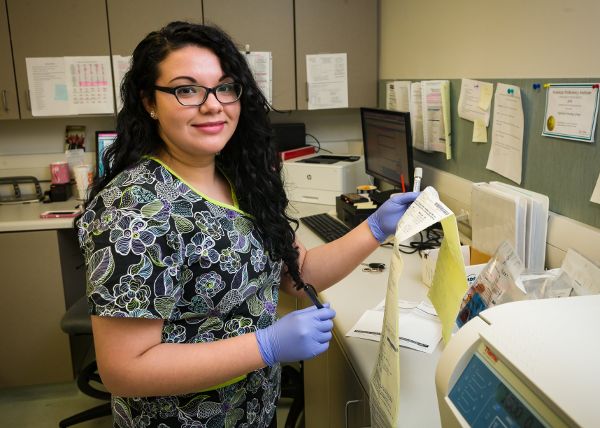Side Effects and Management for Radiation
This is a list of the most common side effects resulting from radiation therapy. This list does not include all side effects from all drugs, but does include those side effects we see most often.
Allergic Reaction – If this side effect were to occur, you might develop hives or a rash, swelling, fever, chills, difficulty breathing, or even low blood pressure. If any of these occur as a result of your medication, you may be given additional anti-allergy medication. Your chemotherapy will be stopped during the reaction and perhaps re-started after the reaction subsides, or stopped and re-scheduled for another day, or discontinued.
Appetite Changes – Foods and liquids may taste different to you because the cells in your mouth, stomach, and intestines have been affected by your chemotherapy. In addition, if you are inactive, this may also decrease your appetite. Despite a poor appetite, it is important to eat nutritiously to help your body recover from the effects of chemotherapy.
Loss of appetite is one of the most common problems that occur with cancer and its treatment. No one knows exactly what causes loss of appetite. It may be caused by the treatments or by the cancer itself. Emotions such as fear or depression can also take away a person’s appetite. For some people, loss of appetite happens for just a day or two; for others, it’s an ongoing concern.
Anemia or Low Red Blood Cell Count – Anemia means the number of red blood cells (RBCs) circulating in your blood is lower than normal. Red blood cells are important because they deliver oxygen to your body. These blood cells are produced in the bone marrow. When chemotherapy kills cancer cells it also kills normal cells such as the red blood cells. Anemia caused by chemotherapy is temporary and usually does not occur for two or more months.
You may experience the following symptoms if your RBCs are low:
- Fatigue, weakness or have a lack of energy
- Dizziness or lightheadedness
- Shortness or breath
- Chest pain
- Difficulty concentrating
- Your skin color may become pale
- Difficulty staying warm
Low Platelet Count – Platelets are the cells in your blood that form blood clots to stop bleeding. They are produced in your bone marrow. As mentioned before, chemotherapy not only kills cancer cells but also healthy cells, such as your platelets. If your platelet count is going to be affected by your chemotherapy, then it will fall 8 to 14 days after your chemotherapy.
If your platelet count is low, you may notice the following:
- Bruise easily or unexplained bruises
- It takes longer to stop bleeding after an injury
- Your gums bleed while brushing your teeth
- Develop nose bleeds more easily
- A headache that will not go away
If you notice any of the above signs or symptoms, notify your doctor.
Low White Blood Cell Count or Neutropenia – White blood cells (WBCs) are the cells that travel throughout your body and help to fight off infection. White blood cells are produced in the bone marrow. When your chemotherapy kills your cancer cells it also kills some of your normal cells such as your white blood cells. WBCs live for a very short amount of time, sometimes just hours after leaving the bone marrow. If your white blood cell count is going to drop after chemotherapy, it will occur 8 to 12 days afterwards.







